
Nebula: What does creator-owned mean?
Silicon Valley-based platforms such as YouTube have come under scrutiny for reasons ranging from forcing creators to only make algorithm-friendly content to promoting uninspired content over high quality and creativity. Seeing these downsides, a few educational YouTubers created a streaming site called Nebula to host their content. Read this article to find out how successfully they managed to provide an alternative for YouTube's Silicon Valley logic.
Nebula: a peculiar streaming service
First of all, Nebula is a fifty percent creator-owned, paid streaming service. This is a critical difference between this platform and YouTube. Users must pay and subscribe to the site. Fifty percent of profits from this and fifty percent of the eventual sales price were the platform ever to be sold goes to its content creators. This shows how Nebula operates along a semi-cooperative structure where laborers carry a stake in the success of the company and directly profit from the products of their labor. The other fifty percent of Nebula is owned either by Standard LLC, an enterprise owned by Nebula founder and content creator Dave Wiskus, or Curiositystream. The latter is a documentary streaming service that has invested in Nebula. By subscribing to a Curiositystream package deal one can also gain access to Nebula.
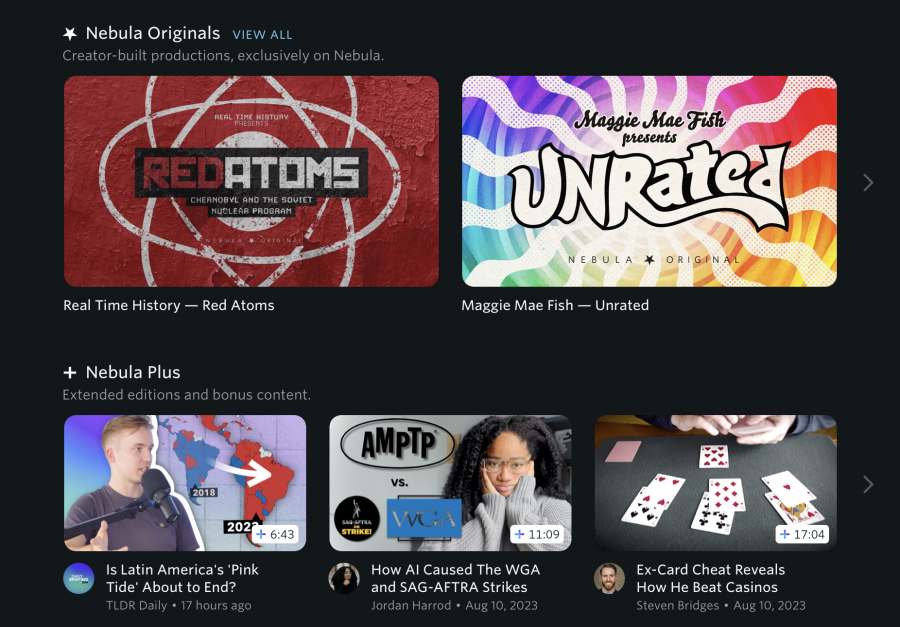
Nebula original and Nebula plus content rows
Nebula's content can be divided into original and other content. Original content is made specifically for the site with funding from Curiositystream or the site itself. In original series such as Jet Lag this funding structure is made clear by presenters. Such content always debuts on Nebula but might be disseminated through YouTube later. Such uploads are often adjusted for YouTube as the creators would say. This is an aspect that is especially salient in much of the site's advertisement material. Videos that have shorter versions uploaded on YouTube are called Nebula Plus content in the site's layout.
Nebula is fifty percent owned by creators on the platform.
Nebula's content can be further divided into videos, podcasts, and classes. Videos are the type of content that you would expect to see on YouTube. The category is extremely internally varied. There are travel documentaries, video essays, and game show/challenge-type videos among other formats.
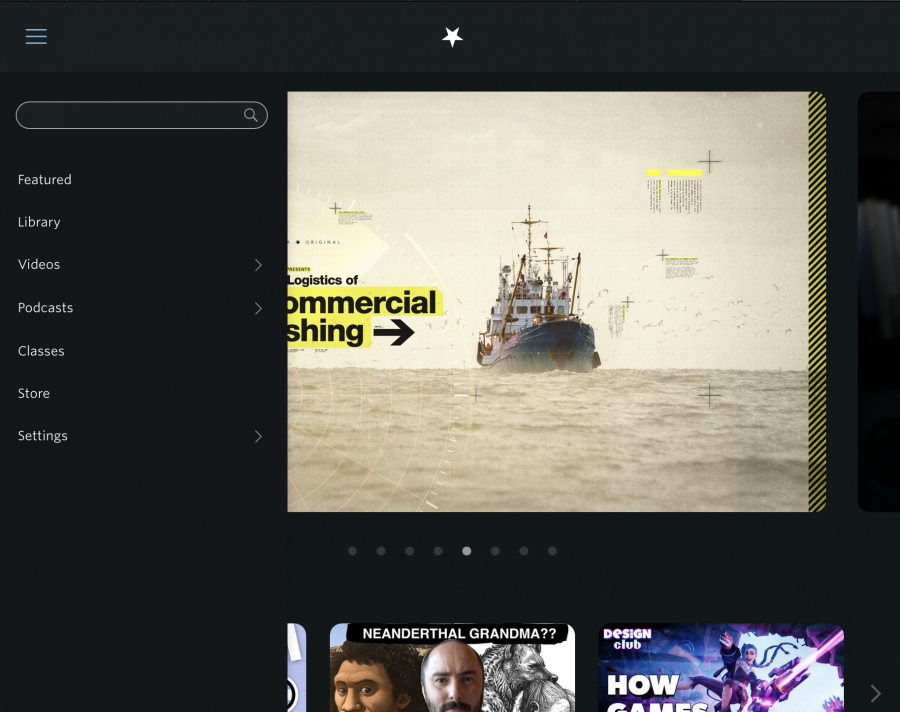
Nebula's main categories
The podcasts category is made up of long-form audio content. In accordance with this idea, transcripts are provided with them on the site. Podcasts on the site cover a wide array of topics. Categories as wide-ranging as film and TV, science and engineering, and gaming are all represented.
The final category of content that the site notes are classes. All these classes are "Nebula original" content. They consist of lessons teaching certain skills and knowledge. Classes are thought by reported experts in a certain field many of which(but not all) are creators involved with Nebula. A broad array of topics is covered although many relate to social media entrepreneurship and content creation.
Why Ideology?
Streaming services are not seen as particularly ideological actors in the popular conception. However, just like any platform, these services are never neutral. Platforms are mediators. They shape our interactions through design and moderation (Van Dijck, 2013). This is particularly salient in this case as the content is selected and posted to the site not by users, but by the creators and administrators involved with Nebula as a company.
Furthermore, Ideologies have material aspects. Socialist newspapers, right-wing extremist blogs, and even institutions such as a national soccer team have ideologies embedded in them. People that hold a specific ideology create and use materials and institutions as ways to shape and spread their ideology (Blommaert, 2005). Streaming services can be seen as such institutions. They help spread and build ideology by selecting specific content and presenting it in a certain way. In this manner, they can give a platform to specific ideas while not including others. This means they can have a significant effect on society through interaction. By creating a platform for specific discourses they can enable and encourage engagement with specific ideologies (Maly,2021).
In this study, I analyze which ideologies are embedded in Nebula. In doing so we can understand where a platform comes from, what its effects can be, how it can shape society, and what the existence of a particular streaming service tells us about society. By assessing what ideologies are embedded in the structures and content of a platform we can better understand said platform and the sociocultural space it exists in. In particular, this example is helpful for gaining insight into the functioning of so-called creator-owned platforms and their non-neutral nature (Van Dijck, 2013).
Finding ideology on Nebula
First of all, I will analyze the ownership structures, design priorities, and earnings model at play on the platform. In doing so, horizontal and vertical variety of data must be assured (Verschueren, 2012). Horizontal variety is created by looking at various types of content. Specifically, I will look at advertising material, about-pages, privacy policy, and prioritization. Vertical variety is created by looking at what these data say on their own and what they can tell us when put together. By looking at these things at these levels we can see how Nebula deals with the total ideology of capitalism. This means we look at what beliefs and ideas exist in the society in which Nebula exists and how Nebula conforms to or subverts these (Barthes, 1957; Blommaert, 2005).
Moreover, I will also look at what content is present and promoted on Nebula. Here it is essential to assure a horizontal and vertical variety of data as well (Verschueren, 2012). Horizontal variety is assured by looking at various genres of data such as different types of videos, and the platform layout. This means that I have viewed over one hundred different videos on the site made by various creators and looked at different pieces of data such as design features. Vertical variation is assured by looking at individual videos and how they operate in the context of shows, channels, and Nebula. In the analysis, priority will be given to content that is made more salient by the design of the platform. For instance, videos with thumbnails that are displayed prominently on the home page will be given more weight than those that one would need to search for.
By analyzing what ideologies are visible in videos, and what content is given priority on the site I hope to find out what sets of ideas are represented and given a platform by Nebula. This allows us to research the easily visible or specific ideologies of the platform (Barthes, 1957; Blommaert, 2005).
Nebula could be said to follow the logic of semi-cooperative content creation
Nebula is a for-profit company. What makes it different from other for-profit streaming services is that it is creator-owned. On their creator/talent site, they explain what this means in the following quote: "We knew that this would only work if the project was creator-owned, which is why Nebula is built as a partnership with our creators. Fifty-fifty. We split the profits every month (based on watch time), and if we ever decide to sell it, half of the sale price goes to the creators". Individual creators thus have a stake in the company and benefit from the profits of their labor directly. The form that this takes is rather curious. Rather than dividing profits on the basis of equality the capitalist popularity principle (Van Dijck & Poell, 2013), operationalized through watch-time, is applied.
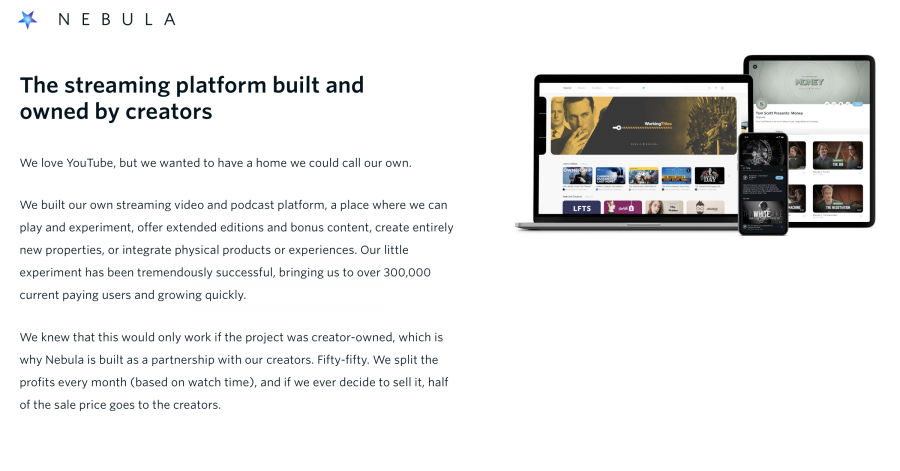
Nebula explains their company structure
Even so, the platform's ownership structures subvert surveillance capitalist hegemony through the aforementioned creator-owned nature of the platform. Creators benefit relatively directly from the products of their labor compared to sites such as YouTube (Ahmad et al, 2021; Yang, 2020). Hence I have dubbed the logic under which Nebula operates semi-cooperative. This means the platform has aspects of a cooperative, but it is still an inherently capitalist organization.
In a true cooperative, ownership of the final products and profits lies fully with the laborers or creators, and participation is fully voluntary (Zeuli et al, 2004). Nebula's structures allow for some level of direct benefit from the product of one's labor by laborers in a voluntary cooperative structure. However, unlike in a true cooperative, Nebula is not fully owned by the laborers. There also seems to be a (rather thin) corporate hierarchy and a (small) set of outside investors. This in addition to the profit goal of the platform does index it as inherently capitalist.
The platform's ownership structures subvert surveillance capitalist hegemony through its creator-owned nature
By combining capitalist and cooperative ideas see that the "wage slavery" (Curl, 2010) that platforms such as YouTube are often criticized for is not exhibited by Nebula. Compared to the logic of surveillance capitalism this is a democratization of the workplace as it accounts for and involves workers to a higher degree in the decision-making and profit division process (Ahmad et al, 2021; Yang, 2020). This democratization fits into much of the discourses used by those in the cooperative movement (Almeida et al, 2020; Curl, 2010).
Nebula emphasizes its subversions of surveillance capitalism
Going further, I will now show how the platform is presented in advertising material. In the video above you can see an advertisement for Nebula, Curiositystream, and their original content. Here emphasis is placed on how the creator-owned nature of the platform enables them to evade the advertiser-friendly policies of YouTube. Over a third of the running time of the video is dedicated to explaining this. Furthermore, the narrator of the video above says that Nebula "focuses on the content itself". Finally, emphasis is placed on the platform's partnership with Curiositystream and Nebula's original content. These points were used in most of Nebula's advertising material.
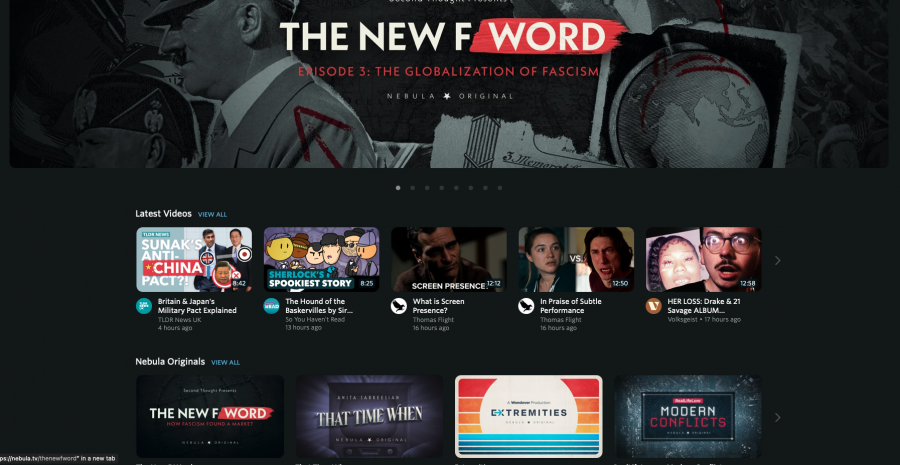
Nebula's Hompage
Original content is also heavily emphasized on the platform itself. As you can see above many of the recommendations and top results on the Nebula homepage are originals. The first and third rows of the homepage are fully dedicated to them. The importance of producing experimental, exclusive content is also emphasized on their about-page, which you can see below. Smart and experimental content as well as the lack of ads are presented as the key selling points of Nebula.
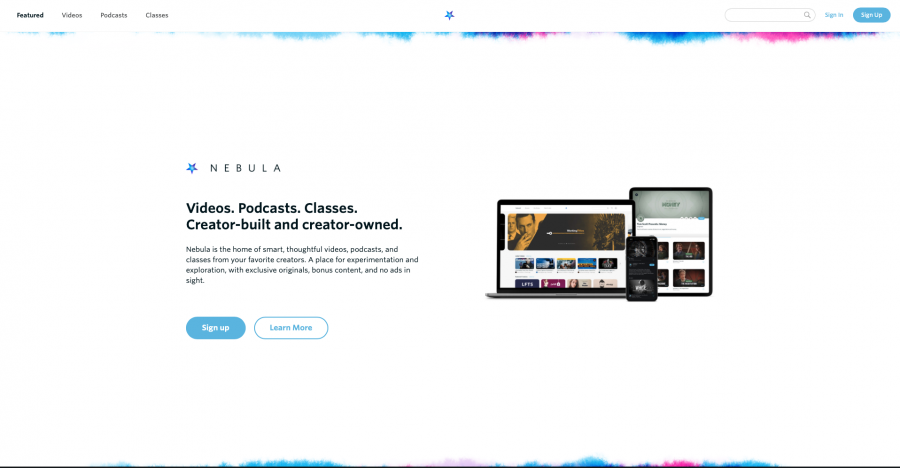
Subscriber about page on Nebula
As we saw in the advertisement earlier, the existence of such content is directly linked to the platform's creator-owned nature. This harkens back to the semi-cooperative structures we discussed earlier. We can see that subverting conventions of Silicon Valley based platform companies through cooperative structures, and not collecting advertisement revenue, are presented as intrinsic to the company's identity and success (Ahmad et al, 2021; Yang, 2020).
This can also be seen in its privacy policy which you will find below. Sentences such as "We won’t sell your data under any circumstances" and "We’ll never subject you to a passive-aggressive guilt trip about unsubscribing to marketing emails. Ew." Make an appearance here. These among other points in their privacy policy show that this company does not attempt to obtain a lot of user data and certainly does not want to share or sell it. This principle of Nebula again directly subverts the logic of surveillance capitalism (Georgakopoulou et al, 2020; Maly, 2021, Zuboff, 2015).

Privacy policy of Nebula part 1

Privacy policy of Nebula part 2
Having analyzed this we find that subversions of surveillance capitalism are presented as essential to the platform. Creative content that is created through semi-cooperative structures, a lack of ads, and not collecting or selling user data are presented as the platform's key differentiating points compared to mainstream platforms such as YouTube. We see a mix of capitalist and cooperative structures in Nebula's structures. (Nergaard, 2014; Kenworthy, 2019). This shows how the site deals with capitalism as a total ideology while subverting some notions thereof (Barthes, 1957; Blommaert, 2005). These cooperative subversions in a capitalist system are what I have dubbed semi-cooperative logic.
Nebula promotes leftist/progressive content
To analyze Nebula's content I will focus on what exists on the site and what is prioritized. As visible below much attention is given to Nebula's original content.

Nebula's Hompage
As you can see there is a big row of thumbnails that dominates the homepage. These videos are the most overtly promoted content on the site. One could say that these are videos that the platform wants subscribers to engage with. Hence I consistently checked what types of content were presented in this manner for two months. Here I noted that all videos were Nebula originals. Furthermore, the second row below this is also a list of such programming.
Such promotion of Nebula's original content makes it logical that the ideas embedded in such content are ones that the platform's creators and designers approve of. At least any ideological aspects of these videos seem to not be deviant on this platform. After all, they are actively promoted through their prominence on the site (Becker, 1964; Foucault, 2003).
It is then notable that roughly a third of these videos had political topics at any time during this research. These could all be said to contain a somewhat leftist perspective. This ranges from overtly Marxist and socialist content to more general leftist progressive discourse.
We can see that a larger leftist narrative is built
The video in the thumbnail above is a good example of the former. It discusses the perceived rise of fascism in the 21st century. This in itself is already a rather ideologically charged subject. This rise is presented as a negative phenomenon through scary music among other things. Second Thought, the channel that posted the video, is very open about its socialist point of view. In its channel description, it says "Second Thought is a channel devoted to education and analysis of current events from a Socialist perspective. Welcome!"
If one goes back across the large catalog of videos posted by the channel we can see that a larger leftist narrative is built. Many issues are addressed from a Marxist angle and full explainers that carry Marxist sentiments are common on this channel.
An example video is visible above this paragraph. It starts with a disclosure of a collaboration with Azure Scapegoat who is described as running a channel covering all sorts of leftist topics. This intertextuality places the video within a specific leftist paradigm. The rest of the video goes on to explain socialism. The author of the video states that they want to correct the record on what socialism is as they feel that the mainstream media portrayal of the ideology is flawed. Then capitalism is explained and criticized through various issues such as the housing crisis. One of the chapters of the video is called, "what is wrong with capitalism". The video is ended with an endorsement of socialist ideals. The quote "Marxism, socialism, communism, pick whichever scary word you want. They represent the rejection of our dystopian state of affairs. They stand for the expansion of human freedom. For the acknowledgment of universal rights. For kindness decency and care for the less fortunate. An America that embraced at least some of the tenants of Marxism would be a nation that didn't destroy the lives of innocent people the world over" shows this most clearly. Socialism here is presented as a viable alternative to late-stage capitalism.
Another creator featured prominently in a Nebula Original video is Philosophy Tube. This show is a theatricalized philosophy course thought by a transgender professor. A making-off video was created as original content by this channel. Philosophy Tube covers many aspects of Marxist ideology and philosophy and thoroughly explains them in rather long-form videos. These videos often cover topics such as feminist critiques of social contract theory and the proposed capitalist origins of Islamophobia. At the very least this topic choice shows the establishment of a platform for the discussion of highly progressive ideas. The video above discusses the good and bad of Marxist ideology in the context of Darwinism. The channel allows for discussion of Marxist ideas whereas many of these ideas would be deviant in other contexts within our neoliberal-hegemonic society (Fisher, 2009; Plehwe, 2016). Similar to the previous channel this creator also references Marxist scholars and creators. This places them more sturdily in the Marxist paradigm (Blommaert, 2005).
Leftist and progressive ideas are given a prominent place on the platform
Of course, providing a platform to two creators that discuss leftist/progressive ideas does not categorically identify Nebula's platform as left-wing. Even so, the fact that leftist-leaning content is so salient on the platform likely shows that Nebula's creators and developers approve of the meanings embedded in such content. Furthermore, it must be noted that Second Thought's and Philosphytube's places on the platform are both quite prominent. Featuring them in Nebula originals whose thumbnails fill up half the homepage makes it easy to see how the ideas that these creators discuss and espouse are given a space on the platform. In turn, we see that leftist and progressive ideas are given a prominent place on the platform.
Moreover, even less political shows, such as game/travel shows tend to have a progressive slant. Additionally, in studying over one-hundred videos on the site over a period of more than two months no overt pro-capitalist or rightwing content was found.
After the research process was concluded J.J. MCcullough, a self-described moderate conservative did join the platform. While he actively disidentifies with leftist ideology, he also does so with far-right ideology. His views hence do not seem to fit into the leftist paradigm. This subverts our previous findings, but given the thoroughly moderate, and singular nature of this creator on Nebula, it does not change the fact that Nebula largely presents a leftist view of the world.
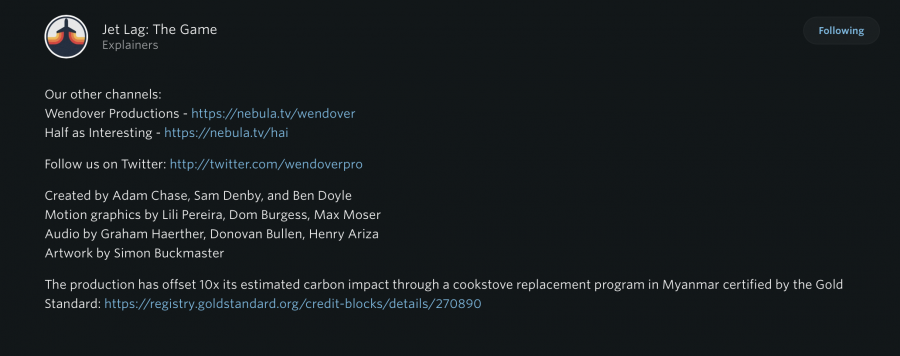
Carbon offset in jetlag the game
An example of less overtly ideological videos carrying indexicals of leftist/progressive ideology is that billionaires like Elon Musk are often called out jokingly in the Nebula Original series Jet Lag. Criticism of the extremely wealthy fits within leftist discourse (Forestal, 2022; Niemuth, 2017; Sanders, 2019). Furthermore, in the screenshot above you can see that all of the carbon emissions that were necessary for the creation of the show because of its nature as a travel/game show were compensated. This also indicates left-wing ideology as climate change is generally a more present issue on the left side of the political aisle (McCright et al, 2016; McCright et al, 2016). Jet Lag is seemingly not a show in which ideology is very front and center but still, some leftist/progressive ideas do slip in. These ideas are treated as normal and thus (micro-)hegemonic on the platform. They are often used as in the examples above but never questioned (Gramsci, 1971).
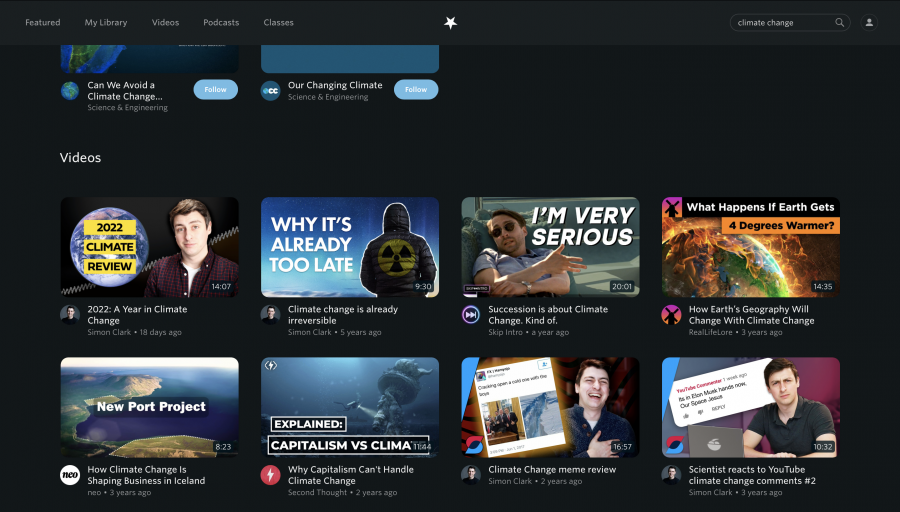
Partial results of inquiry into the presence of climate change skeptical content on Nebula
Moreover, I specifically looked for content that denied or marginalized the impact of climate change on the platform. This was done by looking up the term climate change and analyzing all the titles and thumbnails of the resulting videos. If any thumbnails could indicate climate change denial or marginalization content, the video was watched in full. Through this process, no climate change skeptical content was found.

TLDR's show "Truss Issues"
Furthermore, there is also a channel dedicated to news on Nebula. TLDR is an English YouTube channel that posts a large variety of current-events-related content on Nebula. It also creates Nebula original content. Such content is often rather critical of the right. They have a show called "Truss Issues" that deals with the issues related to Elisabeth Truss, the conservative ex-prime minister of the UK. In this show, TLDR is very critical of procapitalist policies. In other TLDR videos, positive views of leftist ideas such as using state action to lessen the effects of climate change as well as a critical attitude to the privatization of collective industries are expressed (Borre & Viegas, 1995). Discussions on fora also tend to conclude that TLDR is a broadly leftist news source.
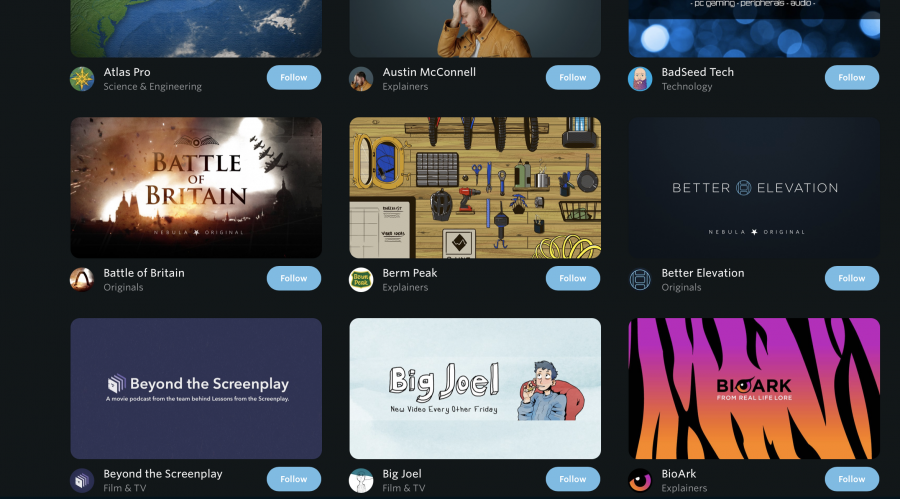
Creators screen on Nebula
Because of all this, we can say that much of the content on Nebula and especially the content that the site prioritizes tends to have some progressive/leftist slant. This is visible through assumptions, what acts and statements are normalized, overt statements of ideology, the ideas that are discussed, and intertextuality. Nebula provides a platform for leftist/progressive ideology. This seems deliberate as what content posted on Nebula is moderated by those in control of the platform (Barthes, 1957; Blommaert, 2005).
Subversions and prioritization make Nebula different
Nebula's structures seem broadly capitalist. This is logical as the society it emerged in is firmly capitalist. This is our society's foundational ideology. However, the site combines capitalist ideas such as being a for-profit company with stockholders with semi-cooperative logic and measures that take into account criticisms of surveillance capitalism. A lack of ads, not commodifying user data, and cooperative-like structures are presented as essential to the platform's identity and success (Blommaert, 2005; Kenworthy, 2019; Nergaard, 2014; Zuboff, 2015).
Meanwhile, the content that the platform hosts and promotes tends to have leftist/progressive ideals embedded into it. This can be very overt such as in the case of Second Thought's endorsements of Marxism, or less so such as in Jet Lag's carbon offsetting. Nebula provides a platform for leftist and progressive discourses. Given that Nebula's admins and creators control what content can exist on the platform this seems a deliberate effort. Such ideologies could then be said to be its specific ideology (Blommaert, 2005; Marx, 1867; Mcwright et al, 2016; Sanders, 2019).
Nebula thus subverts the logic of surveillance capitalism to create a semi-cooperative company that provides a platform for leftist/progressive discourse.
Nebula thus subverts the logic of surveillance capitalism by exhibiting what I have dubbed semi-cooperative logic. In doing so it provides a platform for leftist/progressive discourse. These subversions and the ideas that it provides a place for are what make Nebula different from mainstream sites such as YouTube. I recommend further investigation into how leftists and progressives operate platforms on an internet where surveillance capitalism has become hegemonic (Zuboff, 2012).
References
Barthes, R.,(1957) Mythologies. Paris, Editions du Seuil.
Barbrook, R., Cameron, A. (1996). The Californian ideology. Science as culture, 6(1), 44-72.
Blommaert, J. M. E. (2005). Discourse: A critical introduction. Cambridge University Press.
Borre, O., Viegas, J. (1995). Government intervention in the economy. The scope of government, 3.
Fisher, M. (2009). Capitalist realism: Is there no alternative? John Hunt Publishing.
Gramsci, A., (1971). Selections from the Prison Books. Elecbook. ISBN:190184305X.
Kenworthy, L. (2019). Social Democratic Capitalism. Oxford University Press.
Maly, I. (2021). Ideology and algorithms. Ideology, theory and practice.
Marx, K. (1867). Das Kapital (F. Engels, Ed.). Progress Publishers.
Plehwe, D. (2016). Neoliberal hegemony. In Handbook of Neoliberalism (pp. 89-100). Routledge.
Vermeersch, H. (2015). 150 jaar geleden werd in Gent Vooruit opgericht. Solidair.